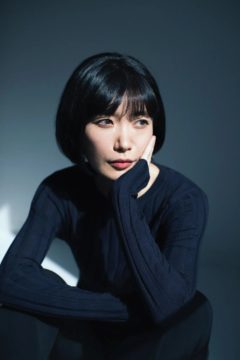Joshua Hunt in The New York Times:
 On the last Friday in November, in the afterglow of a literary awards ceremony, the novelist Mieko Kawakami held court in a banquet hall at the Imperial Hotel in Tokyo, wearing a tweed Gucci dress, clutching an Hermès Birkin handbag and sipping a glass of domestic beer she would never quite finish. Each time she raised the drink to her lips, another writer, editor or publicist came along to distract her from it. Kawakami, who is 46, greeted them each with a degree of warmth that made it hard to tell which were strangers and which were her friends. “I’m a graduate of hostess university,” she said, recalling her years spent working at a bar where she kept men company as they drank. More than two decades later, the skills she honed in the boozy, neon-lit back alleys of Osaka — the ability to observe and to listen with acute curiosity — are still apparent in her best-selling novels. “You can see where that sensitivity arises from in her work,” the translator David Boyd told me. “She sees all the angles.”
On the last Friday in November, in the afterglow of a literary awards ceremony, the novelist Mieko Kawakami held court in a banquet hall at the Imperial Hotel in Tokyo, wearing a tweed Gucci dress, clutching an Hermès Birkin handbag and sipping a glass of domestic beer she would never quite finish. Each time she raised the drink to her lips, another writer, editor or publicist came along to distract her from it. Kawakami, who is 46, greeted them each with a degree of warmth that made it hard to tell which were strangers and which were her friends. “I’m a graduate of hostess university,” she said, recalling her years spent working at a bar where she kept men company as they drank. More than two decades later, the skills she honed in the boozy, neon-lit back alleys of Osaka — the ability to observe and to listen with acute curiosity — are still apparent in her best-selling novels. “You can see where that sensitivity arises from in her work,” the translator David Boyd told me. “She sees all the angles.”
The awards ceremony was hosted by Shueisha, a major Japanese publishing house that recruited Kawakami as a judge, confirming her as an arbiter of taste. “One of the reasons my boss pleaded and pleaded for Kawakami-san to judge for our prize is because of her fame and her popularity among young Japanese writers,” said Yuki Kishi, a literary editor at Shueisha. In the time since Kawakami acquiesced to that role, more women had submitted unpublished manuscripts for consideration, Kishi told me, and more of them took risks concerning voice and content. “A lot of people look up to Kawakami-san’s writing and her style and her energy and her buntai (literary style),” Kishi said as we left the banquet hall. “We want to be her.” What Kawakami wants, however, is to confound expectations by writing books that are at times provocatively against type, as if to prove that there is no category that can contain her.
“I’m not an Olympic athlete,” she told me. “Literature doesn’t represent anything.”
More here.
